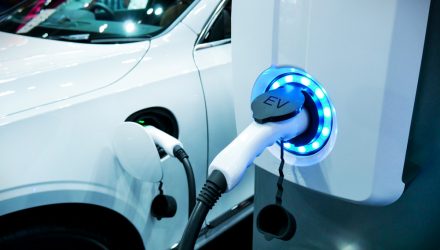It’s been a bumpy year for investors taking broad approaches to electric vehicle stocks and exchange traded funds. For example, shares of Tesla (NASDAQ: TSLA), the largest domestic EC manufacturer, have surged nearly 93%.
Conversely, a variety of other EV original equipment manufacturers (OEMs) have slumped, as have broad measures of lithium stocks. The KraneShares Electric Vehicles and Future Mobility ETF (KARS) has been immune to the turbulent nature of EV investing in 2023. But next year could bring important milestones in the ETF industry.
Some analysts are forecasting that, in 2024, EV sales will account for at least 20% of global automobile sales. Obviously, that could be a boon for OEMs, including several KARS holdings, but the implications are likely to be felt throughout the broader EV ecosystem. Fortunately, KARS provides exposure to that ecosystem.
Bet on Batteries With KARS
One advantage offered by KARS, which follows the Bloomberg Electric Vehicles Index, is that it’s an expansive play on EV investing. That includes exposure to battery makers, which are essential in improving product quality so that EV adoption increases. Some market observers believe EV battery equities could flourish in 2024.
The aforementioned 20% sales milestone “has major implications for battery makers,” according to HSBC. “Mass market consumers are far more price sensitive, so we expect automakers to seek to aggressively cut battery costs, which account for 40% of total EV manufacturing costs.”
Batteries account for $40 of every $100 a consumer spends on an EV. Driving those costs down is imperative to bringing more EV-wary buyers to the market. As those costs decline, manufacturers could face margin pressure. That could signal battery stocks residing in KARS may not be crimped by margin stress.
“The plus side of pricing pressure is that the pace of market consolidation should accelerate. In turn, the scarcity value of competitive battery producers which can reduce the cost of supplying quality batteries will rise,” added HSBC.
LG Energy Solution and Samsung SDI are among the EV battery equities highlighted by HSBC. Both are KARS components, with Samsung SDI ranking as the ETF’s sixth-largest holding.
“SDI has high exposure to that segment through major customers such as BMW, Audi, and Rivian, so we see a relatively limited impact from the aggressive pricing by OEMs to target the mass-market segment,” noted the bank.
For more news, information, and analysis, visit the Climate Insights Channel.

